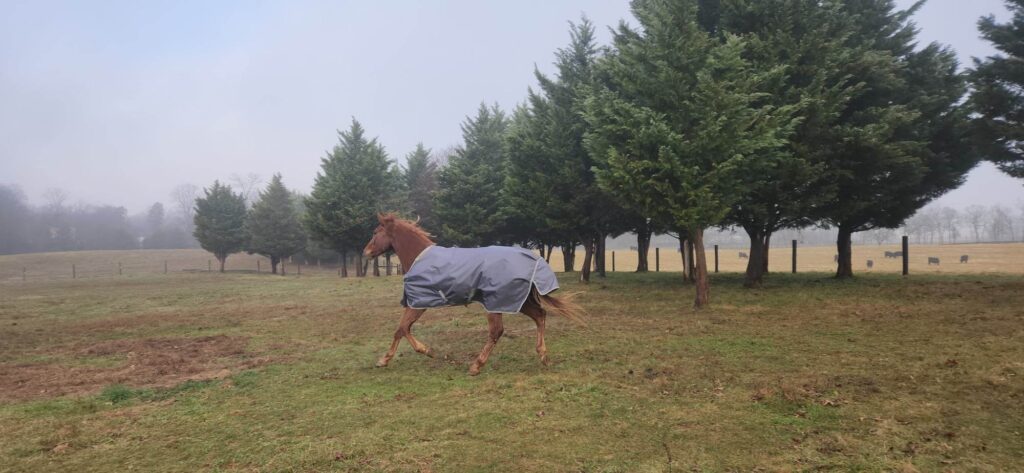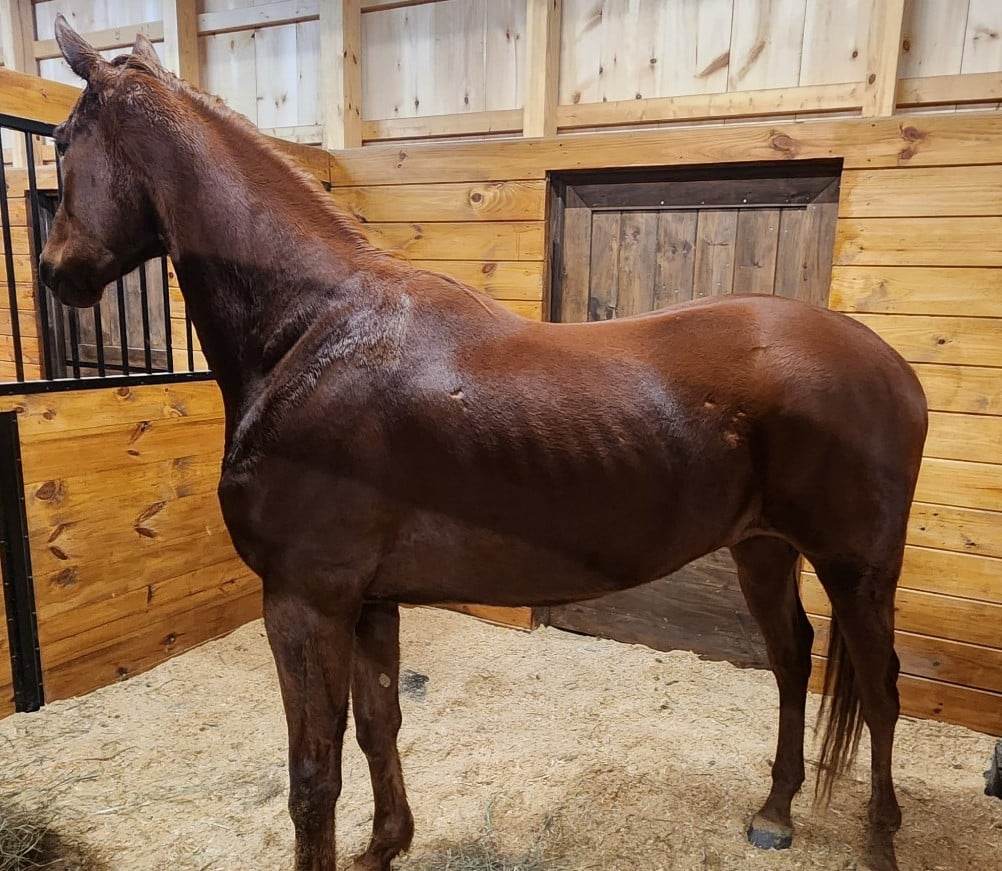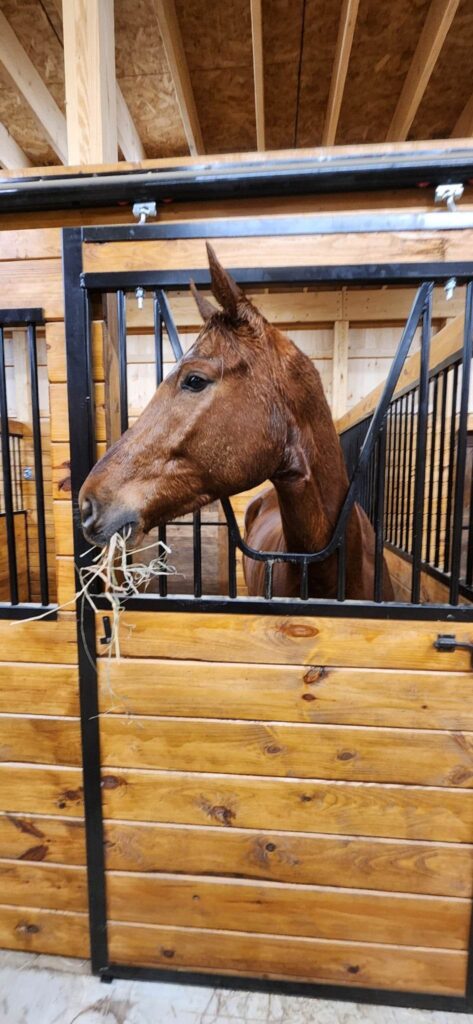
Every year as the weather changes and winter begins knocking at the door, the big blanket debate seems to reappear. There are charts and discussions passed around social media, and inevitably my clients also begin asking what I think. I decided I would create a list for them, and anyone else who might have blanketing questions.
While I do think the charts and diagrams are a valid attempt at helping horse owners decide what is best for their horse, I also feel there is much information missing from the simple chart, which is often based on temperature. The temperature based approach can cause management problems for many of us. For example, larger boarding facilities spend much time trying to set a schedule or routine for their clients, and struggle with managing the large volume of blankets hanging around. The common theme is temperature dictates the weight of blanket. Under 30 gets a heavy blanket, over 50 no blanket, sometimes a rain sheet or light weight blanket somewhere in between.
There are so many conditions that can affect your blanket choice. Strictly using temperature as a gauge is not always in the best interest of the horse. We all want what is best for our horses, and this complicated issue is confusing to many newer horse owners. Sometimes even the best of intentions can be problematic for your horse.
Aside from what the thermometer says, there are other considerations to look at when you are making a decision about your horses blanket needs. Does he have shelter? Does your horse have a thick coat or is he slick and shiny even in the winter? Does your horse have any extra padding, as in chubby, or is he a slender type? Here are 5 key considerations that you may want to think about while making this decision.
1) Weather Conditions
When looking at weather conditions aside from the outside temperature range, wind and rain are two of the big ones. Where I currently live it can be 30 degrees, but with the wind chill will make it feel like 10. In the winter the Virginia wind comes down from the North. It can blow 20 to 40 mph at times. Not every region will have the same type of cold wind, so one cannot say that there is one way to make this choice. You have to really look carefully at what mother nature is giving you and consider wind chill in the temperature when you decide what your horse will need. Horses do not have wind protection naturally built into their coats. They will instinctively turn their rump to the wind as it is the least amount of surface area to lose heat from.
Rain is another consideration. One very important thing to keep an eye on is whether or not your waterproof blanket is actually keeping your horse dry. Do not assume just because the blanket was sold to you as waterproof, that it actually is. And cleaning these blankets can sometimes remove the water repellent protection they offer. It is important that when you pull your blanket off, you pay attention to whether our horse is wet or dry under it. If your horse is boarded somewhere make sure you specifically ask the manager to let you know if your horse is dry under the blanket. I know sometimes when it rains for many days in a row, some horses will wear the same blanket full time for a while. It is important to slip your hand under that blanket and feel whether your horse is nice and dry under it. Aside from bringing their core temperature down, a horse that does not get to dry out will be at risk of skin conditions like fungus or rain rot. They can lose patches of hair, as well as getting very itchy. It can be challenging to get rid of especially in the winter when bathing is not always an option. Another thing to consider is the temperature with the rain. A warm rain is not a problem for most horses. But cold and rainy can bring their temperature down fairly quickly if they do not have shelter. An occasional rain shower is one thing, but a Seattle style nonstop rain for a week, will need some consideration.

This horse is wet under a brand new “waterproof” blanket. His blanket has a neck cover as well. His shoulders and withers were soaked when I removed this blanket.

2) Access to Shelter
Here in VA it is legally required to provide “adequate” shelter for horses living outside. The word “adequate” can have many interpretations and to my knowledge is rarely enforced. That being said, I know it is not always possible for all owners to have nice dry stalls for their horses. And there are horses that do not do well in stalls. Sometimes trees can suffice, or a small run-in shed. But for those living out in the elements, it is our responsibility to consider that we as humans confine horses to our spaces, and they do not always have the options to find themselves shelter like their wild cousins would. If your horse does not have shelter, it is your responsibility to ensure you give them some form of protection from the elements. At the very least they need proper blankets.
3) Horse Body type
Body type does matter. That chubby cobb with a thick coat may not feel the elements near as much as the light bodied TB with a slick thin coat. It takes more calories for the slender horse to keep himself warm, which makes keeping weight on them more challenging. I have not done the math, but the cost of feed these days appears to be much higher than a good blanket. I would rather my horse not be burning those expensive calories to stay warm. At the same time over blanketing a horse can cause them to sweat under the blanket, and once again you are back to that yukky fungus problem.
4) Where You Live
30 degrees in the winter here can be simply 30 degrees. But when the north wind blows, the wind chill can be 10 degrees. I have read that in Alaska you can not blanket a horse, because if they get wet under the blanket it will freeze and cause serious problems. Humidity can be a contributor as well. It can be 40 degrees, but the humidity will feel damp. My point here is that different parts of the country have different climate impacts on a horse’s blanket needs. Saying there is one temperature that all horses do or do not need blankets is not accurate. Know your climate for your region, and maybe be more open minded to those who live in different environments and treat their blanketing decisions differently.
5) Work Load
Are you riding your horse regularly in the winter? Do they get sweaty? Or do they get the winter off? Are they in a stall at night? Are they out full time? Do they have shaggy thick coat, or do you body clip them? What we want from our horses can change how we need to think about their blankets. I prefer to keep my horses that are working blanketed earlier and more thoroughly so that they do not develop a super heavy coat. They get less sweaty and are able to cool off, as well as dry off much quicker. A horse that has a thick coat is similar to you working out in your ski parka and not being allowed to take it off the rest of the day. Have you ever noticed that when you are riding on a chilly day you stop and take your coat off once you get going? Or that if you get sweaty while riding, once you stop you get chilled as that sweat (which is designed to pull heat away from you) does its job? Your horse does not have this option. It can take hours for them to completely dry off. If you blanket them before they are dry you once again run the risk of developing skin problems, such as fungus or rain rot. I have a few youngsters that are not working, they have thick furry coats and I only blanket them when there is precipitation and low temperatures in the forecast. It really is about what you are going to ask of your horse.
There is no one way to do anything in the horse world. We all want to do what is best for our four-legged friends. Choosing the right blanket is a complicated thing. While there are many opinions about what is best, not all horses have the same considerations or lifestyle. It is up to you as your horse’s caregiver to think through the best way to protect your horse from whatever mother nature hands you. Hopefully this will give you some things to think about next time you are looking at your pile of blankets.

Thx.